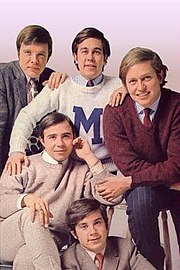Every Mother's Son
| Every Mother's Son | |
|---|---|
 |
|
| Background information | |
| Origin | New York City, New York, United States |
| Genres | Sunshine pop |
| Years active | 1966-1968 |
| Labels | MGM |
| Associated acts | Stone Canyon Band |
| Past members | Dennis Larden Larry Larden Bruce Milner Christopher Augustine Schuyler Larsen Don Kerr |
Every Mother's Son was an American sunshine pop band formed in New York City, New York, in 1966. Coming from a folk rock background situated in Greenwich Village, the group utilized its clean-cut image to score their only Top 40 hit "Come on Down to My Boat" in 1967. Following their brief, but immense, commercial success, Every Mother's Son achieved lesser fortunes with songs such as "Put Your Mind at Ease" and "Pony with the Golden Mane", and recorded two studio albums before disbanding in 1968.
The nucleus of Every Mother's Son formed in early 1966, when brothers Lary (vocals, guitar) and Dennis Larden (vocals, guitar) met Bruce Milner (organ, piano) at a Greenwich Village nightclub. The Larden brothers had previous experience playing four years together as a folk duo for engagements in Greenwich Village's burgeoning music scene. Milner had also spent time performing with various folk bands, but desired to involve himself with a group long-term. Soon after meeting the Larden brothers, they recruited Schuyler Larsen (bass guitar) and Christopher Augustine (drums), forming a quintet named Every Mother's Son, and rehearsed their sound before playing professionally.
The band invited Peter C. Leeds, a manager the Larden brothers knew from their days as a folk act, to spectate at a performance for a college fraternity. Impressed by what he witnessed, Leeds signed Every Mother's Son to a contract, and introduced the band to Wes Farrell, a songwriter and record producer who composed songs such as "Hang on Sloopy", "Boys", and "Come a Little Bit Closer". Sensing the group's potential, Farrell utilized his Senate Records studio to record a dozen demo sides with Every Mother's Son. Through Farrell's connections in the music industry, five major record labels expressed interest in the band; ultimately, MGM Records signed the group as a clean-cut alternative to the 1960s counterculture.
...
Wikipedia
